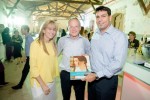Marc and Chantal Belzberg with MK Danny Danon, centre, at OneFamily’s August 2013 launch of Longing for a Hug, an exhibit of original artworks created from the personal stories of bereaved Israeli children. (photo from Finn Partners)
In the summer of 2001, Jerusalemites Marc and Chantal Belzberg were busy planning their daughter Michal’s bat mitzvah. Relatives from Vancouver and New York were booking their flights to Israel in anticipation of what was to be a huge and festive family gathering. Then, on Aug. 9, 2001, just one month before the bat mitzvah celebration, a suicide bomber entered the Sbarro pizza shop in Jerusalem and executed one of the most notorious terror attacks of the Second Intifada. The family was faced with an uncomfortable question: How could they possibly celebrate in the face of such great tragedy?
The Belzbergs decided to cancel the party and instead committed themselves to a bat mitzvah project. They would visit and console the injured and bereaved families of the Sbarro bombing, and the money that Michal’s extended family would have spent coming to Israel for the celebration would be collected and turned into a fund for these victims of terror.
Less than a week later, another suicide attack wounded 15 Israelis in a café. The needs were clear, and the Belzbergs felt that they had to try to assist these latest victims of terror, as well.
“It turned into a family project, a long-term commitment that we took on after several months of working with the victims,” Chantal Belzberg, now the executive vice-chair of OneFamily, recalled. “We came to the simple conclusion that if they need help, they are our family. We wanted to help every one of them.”
The small family project quickly blossomed into a large nonprofit operation. From the tragedies of the Second Intifada, OneFamily, a national organization dedicated to the rehabilitation of victims of terror attacks and their families, was born. Though maintaining the organization was a daunting task, a strong family history of commitment to the Jewish community prepared them for the challenge.
The Belzberg family has roots in Vancouver that go back 46 years, when they moved here from Edmonton in 1968.
“I went to Eric Hamber High School but, for Grade 10, my parents sent me on a program called Haddasim,” Marc Belzberg recalled, referring to the program sponsored by Hadassah-WIZO that sent groups of Canadian teenagers to Israel for the year in order for them to serve as youth ambassadors upon their return. Along with the deep connection he forged with the land of Israel, he also developed a love for philanthropy, a familial commitment he picked up in his youth.
“My father, Samuel Belzberg, was involved with and actively supported so many institutions and programs, both in Vancouver and throughout North America. He supported Simon Fraser University and started a leadership program called Action Canada for the 15 best and brightest future leaders in the country. In the Jewish community, he supported the Conservative synagogue Beth Israel and [an] Orthodox synagogue, Schara Tzedeck. He invested in Jewish education in Vancouver through his work with Vancouver Hebrew Academy, Vancouver Talmud Torah, the former Maimonides [Secondary School], and now King David High School, as well as NCSY, and he helped preserve Jewish history, contributing to the foundation of the Wiesenthal Centre and the Museum of Tolerance in Los Angeles.”
Imbued with a sense of communal responsibility and a love for Israel, Marc and Chantal Belzberg moved their family to Jerusalem in 1991. With the foundation of OneFamily 10 years later, they continued the family legacy of philanthropic work.
OneFamily supports victims of terror from the time of impact, and continues to provide assistance, be it emotional or financial, for as long as needed, Marc Belzberg explained. “Today, the support required is so different. People don’t know what is going on here in Israel, like they did during the intifada. Thank God, attacks are not happening on a large scale like they were, but they are happening on an individual level: an officer is stabbed, a soldier is killed while sleeping on the bus. But there are no more headlines like there used to be.”
This reality makes the work undertaken by OneFamily even more important. “OneFamily does not just provide an emergency response, we are in it for the long term,” said Marc Belzberg. “That means we are there for the young man who is scared to start his own family due to trauma a decade earlier. We are there to pay for IVF treatments for the woman over 40 who lost her children. And we are there for the woman who cannot support her children due to severe PTSD from three separate terror attacks.”
A quarter of OneFamily’s budget goes to the children’s division, because, as Chantal Belzberg explained, children have the greatest chance of fully healing from trauma. Each child is paired up with a volunteer counselor who builds a relationship with the child(ren). They are present for important dates, such as the yahrzeit (anniversary) of family members who were killed.
As a “full-service” organization, OneFamily helps victims throughout the entire healing process and provides financial aid, including lobbying the government to ensure that victims are receiving the funding to which they may be entitled. They also provide social services, including psychological treatment, Shabbat retreats, summer camps and other activities to help bring victims together. She summarized OneFamily’s approach simply: “Victims can help each other. Healing happens better together than alone.”
While the headlines about Israel focus on peace talks, it is important to remember the individuals who have suffered throughout the conflict and need continuing support. As the Belzbergs see it, every last one of them is family.
For more information about OneFamily, visit onefamilytogether.org.
Nicole Grubner is a former Vancouverite who now lives and works in Israel. This article appears courtesy of Finn Partners.

